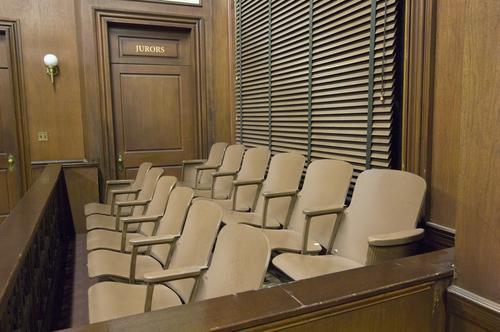The Burden Of Proof
 In civil cases, plaintiffs are required to establish their cases by a "preponderance of the evidence," or something slightly greater than 50-50. Picture the scales of justice tipping ever so slightly in one direction or the other. But in a criminal case, the burden of proof is much higher. A defendant's guilt must be proven "beyond a reasonable doubt." In other words, even though there may be some evidence of a defendant’s guilt, that evidence is often insufficient for a jury to return a guilty verdict in many cases.
In civil cases, plaintiffs are required to establish their cases by a "preponderance of the evidence," or something slightly greater than 50-50. Picture the scales of justice tipping ever so slightly in one direction or the other. But in a criminal case, the burden of proof is much higher. A defendant's guilt must be proven "beyond a reasonable doubt." In other words, even though there may be some evidence of a defendant’s guilt, that evidence is often insufficient for a jury to return a guilty verdict in many cases.
What it Means
There is no precise definition for "reasonable doubt." In fact, in The Land of Lincoln, it is illegal for the court to define the term for jurors. This concept, however, became a bit controversial in a recent case heard by an Illinois appellate court. During the original trial, the presiding judge said ,"It is for the jury to collectively determine what reasonable doubt is." Such an utterance seems innocuous, and perhaps even nonsensical. But, it may, and in this case did lead an appellate court to overturn the verdict, because such a phrase causes jurors to think they must define the term objectively.
This stance clearly favors defendants. Instead of performing an intellectual evaluation or marking boxes on a checklist, which the prosecutor typically wants people to do, "reasonable doubt" is more of an emotional response.
Creating Reasonable Doubt
If an attorney can create a reasonable doubt as to one element of the offense in the mind of the jury, the defendant is not guilty. Some common techniques include:
- Reasonable Alternative: A defense attorney may present a plausible scenario in which someone else is actually responsible for the actions in question;
- Where There’s Smoke, There’s Fire: If Witness A testifies that a meeting took place at 2:00 and evidence shows that the meeting was at 3:00, it may be reasonable to conclude that the witness was mistaken about more than just the time; or
- Confusion: Sometimes referred to as the "sink-and-ink" defense, this tactic is particularly useful in complex trials with multiple expert witnesses.
Other common defenses include legal affirmative defenses, such as self-defense or defense of property, and the use of illegally-obtained evidence, such as drugs seized from a house without a warrant. An aggressive lawyer can convince a jury to return a not-guilty verdict even if there is substantial evidence against the defendant. For a free consultation with an experienced criminal defense attorney in Kane County Arlington Heights, contact Brian J. Mirandola at 847-488-0889. We will review your case and help you understand your options under the law.








